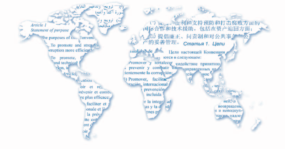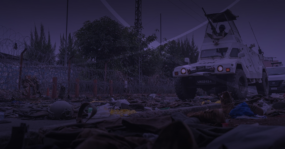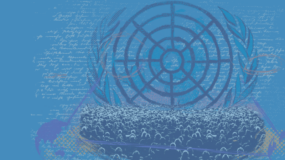Is the idea of a review mechanism for the UN Convention against Transnational Organized Crime dead?
Effective implementation of the UN Convention against Transnational Organized Crime (UNTOC) has long been hindered by a series of technicalities. First and foremost among these has been the struggle to develop a functional review mechanism, similar to the review processes seen in the UN Convention against Corruption (UNCAC) and the Universal Periodic Review of the UN Declaration and Charter of Human Rights. Such a review process would enable monitoring of the implementation of the convention among states parties.
This issue has recurred continually since the very first session of the Conference of the Parties (COP) in 2004, but remains unresolved. A resolution taken at the 2016 COP, which aims to ‘continue the process of establishing the mechanism’, has yielded a lot of discussion but, sadly, few results.
Of course, achieving a review mechanism is no end in itself – but it would provide a concrete set of activities within the wider landscape of progress on UNTOC and a focus on its implementation. And, like all review mechanisms, such a process may have its drawbacks. Yet the attendant discussions and engagements at state level that a review mechanism would entail could at least prompt some momentum and pressure. Either way, without an effective system of review, the convention may shrink into irrelevance, with no checks on what states have achieved in terms of meeting its provisions.
International divisions over the review process
Opinion among countries is divided on the review mechanism issue. Broadly, there are four groups of countries, although some states have shifted their stance as negotiations have proceeded.
The first, and largest, is a group of developing countries that includes China and Russia. Pakistan, Iran and South Africa are particularly vocal here. Their position strongly supports a review mechanism paid for by the UN regular budget and similar in set-up to that of the UNCAC. There is, however, a strong lobby within this group that disputes the role of civil society input in what is seen as effectively a government-determined process. In short, their vision is a core funded mechanism that excludes outside views and gives strong control to states parties.
The second broad group, led by the US, and with support from the UK, Japan, Australia and Canada (although Canada’s position has apparently softened), is strongly against the use of the UN regular budget to support the mechanism. This school of thought is partly based on a broader policy of containing UN regular budget growth, but it is also linked to a seeming discomfort with an onerous mechanism that taxes government resources. The US, for one, has recently proposed several options for a ‘review mechanism light’, each of which limits the costs and the role of the secretariat, as well as the depth and reach of the mechanism.
While this second group is largely seen to be supportive of civil-society input, it is telling that the countries involved have not articulated their position on the issue. ‘Scratch the surface,’ says one diplomat involved in the process, ‘and you will see that civil society is not really the main preoccupation here.’
Conspiracy theories abound as to why these states are hedging against the development of the review mechanism, given that a global push against organized crime seems to be in line with what they say publicly. One theory is that such developed states don’t want to be reviewed by smaller and developing states. The countries involved have also argued that the UNCAC process has been too onerous, yet even this is seen as a smokescreen, as many of them have been strongly supportive of the process at other times.
The third group is a set of European states – most prominently Italy, but also France and, to some extent, Germany – combined with Latin American countries, such as Mexico and Costa Rica. Although these countries are eager for a review mechanism that includes civil-society participation, there is some flexibility here, as most are ready to compromise to take the process forward, including on a weakened role for civil society. Italy plays an important role as convenor in this grouping, partly because of its historical link to the convention and a feeling that it needs to be reinvigorated.
The final group of states includes just two: Norway and Switzerland. These have consistently pushed the important role that civil society might play, sometimes, as others have griped, to the detriment of the process as a whole, which, they argue, should focus on resolving the bigger issues at stake.
At an impasse
As things stand now, no agreement seems possible. There is just not enough consensus in the room nor enough outside pressure to bang heads together and reach an agreement. The secretariat is almost universally seen as not having provided a vision, although, as officials themselves, they have been constrained in terms of what they can do.
The overall result of this is that an enormous amount of diplomatic energy has gone into these discussions, without any clear outcome – other than uncertainty: no one really knows how well the convention is being implemented globally. While numbers have been presented by some states (mainly the US) on international cooperation, few others have these to hand. There is also little evidence that the provisions for formal international cooperation contained in the convention have been widely implemented beyond a few states, as Neil Boister has argued in a recent article. The prevention provisions have been barely explored, and the focus on information sharing and research has been left untouched.
It is hard not to reach the conclusion that UNTOC has not achieved its potential and is unlikely to do so soon. A great deal of argument has yielded pitifully few results. Some options for a review mechanism among a few like-minded or willing states may eventually materialize – but they are unlikely to carry the universality that is needed to drive wider consensus.
El proceso de evaluación de la UNTOC, frustrado por las divisiones
¿Está muerta la idea de un mecanismo de examen de la Convención de la ONU contra la Delincuencia Organizada Transnacional?
Hace mucho tiempo que la implementación efectiva de la UNTOC se ve entorpecida por una serie de tecnicismos. Ante todo, están las dificultades para desarrollar un mecanismo funcional de examen similar al de los procesos de evaluación vistos en la Convención de la ONU contra la Corrupción (UNCAC) y en el Examen Periódico Universal de la Declaración y el Consejo de los Derechos Humanos de la ONU. Un examen de este tipo permitiría verificar la aplicación de la convención entre los Estados Parte.
El tema ha sido tratado varias veces desde la primera sesión de la Conferencia de las Partes (COP) en 2004 y sigue sin resolverse. Una resolución tde la COP de 2016, la cual procura “continuar el proceso para establecer un mecanismo”, ha generado muchos debates pero, lamentablemente, pocos resultados.
Desde luego que alcanzar un mecanismo de evaluación no constituye un fin en si mismo, pero ofrecería una serie de acciones en concreto y un foco sobre el nivel de aplicación de la convención. Como todo mecanismo de evaluación, un proceso de este tipo puede presentar sus inconvenientes. Sin embargo, los debates entre los asistentes y la participación a nivel estatal que supondría un mecanismo de examen por lo menos podría generar algún impulso y algo de presión. De cualquier modo, sin un sistema efectivo de evaluación que controle lo realizado por los países para cumplir con las disposiciones de la convención, la UNTOC puede ir camino hacia la irrelevancia.
Las diferencias internacionales en torno al proceso de examen
La opinión entre los países alrededor del mecanismo de evaluación está dividida. En términos generales, existen cuatro grupos, aunque algunos Estados han cambiado su posición durante el transcurso de las negociaciones.
El primero y más grande consta de países en vías de desarrollo, entre los que se encuentran China y Rusia. Pakistán, Irán y Sudáfrica tienen una opinión muy fuerte. Apoyan firmemente un mecanismo de examen cubierto por el presupuesto ordinario de la ONU y con una configuración similar al de la UNCAC. Sin embargo, hay una fuerte presión dentro de este grupo que pone en duda la contribución de la sociedad civil en lo que se percibe como un proceso fijado por los gobiernos. En resumen, su postura es la de un mecanismo financiado por la ONU que excluya la opinión externa y le de un fuerte control a los Estados Parte.
El segundo grupo, liderado por los EEUU y apoyado por el Reino Unido, Japón, Australia y Canadá (aunque, aparentemente, la postura de Canadá se ha flexibilizado), está absolutamente en contra del uso del presupuesto ordinario de la ONU para llevar adelante el mecanismo. Esta escuela de pensamiento se basa, en parte, en una política más amplia para contener el crecimiento del presupuesto ordinario de la ONU, pero está también relacionada con el aparente descontento con un mecanismo oneroso que grave los recursos gubernamentales. EEUU, por ejemplo, propuso hace poco varias opciones para un mecanismo de examen, en las cuales se limitan los costos y el rol de la Secretaría, como también la profundidad y el alcance del mecanismo.
Si bien este segundo grupo apoya la contribución de la sociedad civil, es evidente que no han articulado su posición sobre el tema. “Escarba un poco y verás que la sociedad civil no es la principal preocupación”, dijo un diplomático involucrado en el proceso.
Abundan las teorías conspirativas sobre la razón por la que estos países se oponen al desarrollo de un mecanismo de evaluación, dado que la presión mundial contra la delincuencia organizada parece estar en línea con lo que dicen públicamente. Una teoría es que estos países desarrollados no quieren ser evaluados por países más pequeños y en desarrollo. Los países de este grupo también han argumentado que el proceso de la UNCAC ha sido demasiado oneroso, pero incluso esto es visto como una cortina de humo, puesto que muchos de ellos han apoyado contundentemente el proceso en otras ocasiones.
El tercer grupo es una serie de países europeos – en los que el más prominente es Italia, pero también Francia y, en cierta medida, Alemania – y latinoamericanos, como México y Costa Rica. Pese a que estos países ansían un mecanismo de revisión que incluya la participación de la sociedad civil, tienen algo de flexibilidad, ya que muchos están dispuestos a hacer concesiones en miras a poner el proceso en marcha, incluyendo minimizar el rol de la sociedad civil. Italia tiene un papel importante como conciliador del grupo, en parte por su relación histórica con la convención y por una sensación de que necesita ser revitalizada.
El último grupo comprende sólo dos países: Noruega y Suiza. Ambos han resaltado consistentemente el papel importante que podría desempeñar la sociedad civil, a veces, como algunos critican, en detrimento de todo el proceso que, señalan, debería enfocarse en resolver los problemas más grandes.
En un impasse
Tal y como están las cosas ahora, no parece vislumbrarse un acuerdo. No existe consenso suficiente en la sala ni suficiente presión externa como para aunar cabezas y llegar a un acuerdo. La percepción casi universal sobre la Secretaria es que no ha ofrecido una visión, aunque, como funcionarios mismos, han sido limitados en términos de lo que pueden hacer.
El resultado general es que se ha volcado mucha energía diplomática en estas discusiones sin un resultado claro más que la incertidumbre: nadie sabe realmente cómo se está aplicando la convención en el mundo. Si bien algunos Estados han presentado algunos números (principalmente los EEUU) sobre el grado de cooperación internacional, son pocos los que tienen las cuentas hechas. Existe también poca evidencia que las disposiciones para la cooperación internacional formal comprendidas en la convención hayan sido implementadas ampliamente con excepción de algunos pocos Estados, como señaló Neil Boister en un artículo reciente. Las disposiciones sobre prevención casi no han sido exploradas, y el punto sobre la distribución de información e investigación no ha sido tocado.
Es difícil no llegar a la conclusión de que la UNTOC no ha alcanzado su potencial y es poco probable que lo haga en el futuro cercano. Se han entablado muchos debates que, lamentablemente, han arrojado pocos resultados. En algún momento, podrían materializarse algunas opciones para un mecanismo de examen entre algunos Estados que comparten la misma postura o voluntad, pero es poco probable que tengan la universalidad que se necesita para ampliar el consenso.



